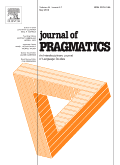
JOURNAL OF PRAGMATICS
Scope & Guideline
Advancing Knowledge in Pragmatics and Beyond
Introduction
Aims and Scopes
- Language and Interaction:
The journal showcases studies that examine the pragmatic aspects of spoken and written communication, emphasizing how language functions in real-world interactions. - Cultural and Contextual Variability:
Research often highlights how cultural differences affect pragmatic strategies and interpretations, providing insights into how language is used in various social contexts. - Multimodal Communication:
There is a consistent focus on how non-verbal cues, such as gestures and prosody, complement verbal communication, reflecting an understanding of language as a multimodal construct. - Pragmatic Markers and Discourse Strategies:
The journal publishes articles that investigate various pragmatic markers and their roles in managing discourse, including politeness strategies, turn-taking, and conversational implicature. - Applications in Professional Contexts:
A significant portion of the research addresses practical applications of pragmatics in fields such as healthcare communication, legal discourse, and online interactions. - Interdisciplinary Approaches:
The journal encourages interdisciplinary research that connects pragmatics with fields such as cognitive science, sociolinguistics, and discourse analysis, promoting diverse methodologies and theoretical frameworks.
Trending and Emerging
- Digital Communication:
Recent publications have increasingly tackled the pragmatics of digital interactions, including social media discourse, online politeness strategies, and the impact of technology on communication. - Multimodal Pragmatics:
There is a growing trend towards examining how various modes of communication (verbal, visual, gestural) interact in conveying meaning, reflecting a more holistic understanding of human communication. - Pragmatics and Identity:
Studies focusing on how language constructs and negotiates identity in various contexts—such as gender, ethnicity, and social media—are becoming more prevalent, indicating a shift towards sociopragmatic dimensions. - Health Communication:
Research addressing pragmatic issues in healthcare contexts, including doctor-patient interactions and communication strategies during medical consultations, is increasingly significant and relevant. - Intercultural Pragmatics:
Emerging themes explore how pragmatics varies across cultures, with a focus on how language use reflects and shapes cultural identities and practices.
Declining or Waning
- Traditional Linguistic Structures:
Research primarily centered on rigid grammatical frameworks is less common, as scholars increasingly explore the fluidity and contextual variability of language use. - Overemphasis on Formal Models:
There is a noticeable decline in studies that rely heavily on formal models of pragmatics without considering the social, cultural, or contextual factors influencing language use. - Static Politeness Frameworks:
The exploration of politeness has shifted from rigid frameworks to more dynamic and context-sensitive approaches, leading to fewer papers focusing solely on traditional politeness theories.
Similar Journals
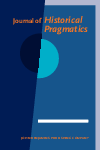
Journal of Historical Pragmatics
Fostering Dialogue Between History and PragmaticsJournal of Historical Pragmatics, published by JOHN BENJAMINS PUBLISHING CO, stands as a pivotal platform in the field of linguistics, focusing on the intersection of language, history, and pragmatics. With its ISSN 1566-5852 and E-ISSN 1569-9854, this esteemed journal has been curating scholarly discussions since 2000, with a converged publication timeline extending to 2024. Acknowledged for its academic rigor, it holds a commendable Q2 category ranking in the Linguistics and Language domain and features impressive Scopus rankings, being placed at #202 out of 1088 in Arts and Humanities and at #237 out of 1167 in Social Sciences. The journal is instrumental in advancing our understanding of historical language use and its sociocultural ramifications, offering researchers, professionals, and students a rich repository of articles that contribute to both theoretical and practical applications in historical linguistics and pragmatics. By fostering interdisciplinary dialogue and promoting innovative methodologies, Journal of Historical Pragmatics not only enriches scholarly literature but also strengthens the global academic community in uncovering the complexities of language through time.

Functions of Language
Illuminating the Dynamics of Language FunctionsFunctions of Language, published by John Benjamins Publishing Co, serves as a vital platform for scholars and practitioners in the fields of linguistics and language studies. With its ISSN 0929-998X and E-ISSN 1569-9765, this esteemed journal, based in the Netherlands, has solidified its reputation through a focused dedication to exploring the multifaceted roles that language plays across various contexts. Ranked in the top percentile of leading journals in Linguistics and Language (Q2 category, 2023) and holding impressive Scopus ranks within both the Arts and Humanities and Social Sciences sectors, the journal emphasizes research that interlinks theoretical insights with practical implications. Functions of Language aims to advance our understanding of linguistic structures and their applications, making it an essential resource for researchers, professionals, and students alike who are eager to contribute to the evolving discourse in language studies. With content converging from 1994 to 2024, the journal reflects ongoing scholarly engagement and innovation in the field.
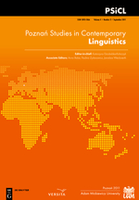
Poznan Studies in Contemporary Linguistics
Advancing understanding in contemporary linguistics.Poznan Studies in Contemporary Linguistics, published by DE GRUYTER MOUTON, is a pivotal journal in the field of linguistics, with an ISSN of 0137-2459 and an E-ISSN of 1897-7499. Located in Germany, this esteemed journal has consistently contributed to the academic landscape since its inception. As of 2023, it holds a Q2 category rank in Linguistics and Language and boasts commendable Scopus rankings, featuring in the 69th percentile for Arts and Humanities and the 66th percentile for Social Sciences. The journal emerges as a vital platform for scholars to explore contemporary linguistic theories and practices, making it an essential resource for researchers, professionals, and students alike. With a converged publication period from 2007 to 2024, it aims to facilitate a deeper understanding of linguistic advancements and trends. While the journal currently does not offer open access, its rigorous peer-review process ensures the highest quality of published research, strengthening its role as a leading discourse in the dynamic field of linguistics.
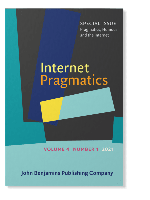
Internet Pragmatics
Fostering Interdisciplinary Dialogue in a Digital AgeInternet Pragmatics, published by John Benjamins Publishing Company, stands as an essential journal within the fields of Computer Networks and Communications and Linguistics and Language. With an ISSN of 2542-3851 and an E-ISSN of 2542-386X, it has been dedicated to exploring the nuanced interactions and societal implications enabled by the internet since its inception in 2019. The journal has quickly gained a strong academic reputation, achieving a Q3 ranking in its Computer Networks and Communications category and a prestigious Q1 ranking in Linguistics and Language for 2023, showcasing its vital contribution to interdisciplinary discourse. Researchers and professionals alike can benefit from its robust collection of articles that delve into the intersection of technology and communication, making it a pivotal resource for those keen on understanding the evolving landscape of digital interaction. Although currently available through traditional access options, the journal endeavors to broaden access, ensuring that valuable insights in this rapidly advancing field reach a wider audience.

Voprosy Yazykoznaniya
Illuminating the Landscape of Language StudiesVoprosy Yazykoznaniya, published by the esteemed Russian Academy of Sciences and the State Academy of Humanities (GAUGN), stands as a leading journal in the field of linguistics and language studies. With an impressive Q2 rank in Linguistics and Language for 2023 and a strong position within Scopus rankings, this journal fosters scholarly dialogue and pushes the boundaries of linguistic research by providing a platform for innovative studies, reviews, and analyses. Although not open access, its publication ensures high academic standards and visibility within the global academic community. Researchers, professionals, and students alike can benefit from the rich insights and diverse perspectives presented in this journal, serving as a vital resource for anyone interested in the intricacies of language and its role in society. Operating since 2009 and continuing to 2024, Voprosy Yazykoznaniya is an essential reference point for contemporary linguistic scholarship in the Russian Federation and beyond.

Semantics & Pragmatics
Illuminating the Dynamics of Meaning in ContextSemantics & Pragmatics is a distinguished open-access journal published by the Linguistic Society of America, dedicated to advancing the understanding of the intricate interplay between semantics and pragmatics in linguistics. Since its inception in 2008, the journal has emerged as a vital resource for researchers, professionals, and students alike, fostering scholarly dialogue and innovation within the field. Boasting an ISSN of 1937-8912, this journal provides an essential platform for the publication of high-quality research articles, theoretical discussions, and empirical studies that delve into meaning, context, and communication. As a leading publication in linguistic studies, Semantics & Pragmatics plays a crucial role in shaping contemporary discourse and promoting interdisciplinary approaches, making it a valuable asset for anyone seeking insights into linguistic theories and their practical applications.
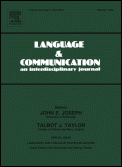
LANGUAGE & COMMUNICATION
Unveiling insights in language use and communication theory.LANGUAGE & COMMUNICATION is a prestigious journal published by PERGAMON-ELSEVIER SCIENCE LTD that serves as an essential resource for researchers and practitioners in the fields of communication, linguistics, and psychology. With a focus on interdisciplinary approaches, this journal has maintained a strong impact, as evidenced by its high rankings—Q1 status in communication and linguistics, and notable categories in experimental and cognitive psychology, as highlighted by the 2023 Scopus rankings. Established in 1981, LANGUAGE & COMMUNICATION combines rigorous empirical research with practical applications, making it a critical forum for advancing understanding in language use and communication theory. While currently not an Open Access journal, it offers vital insights to academics and professionals alike, facilitating knowledge dissemination and sparking meaningful dialogue within the community. Its commitment to excellence is further demonstrated by its contributions to key areas of study, positioning it as a vital publication for anyone invested in the exploration of language and human interaction.
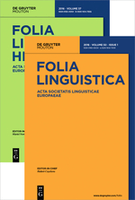
FOLIA LINGUISTICA
Elevating Understanding of Language Structures and UsageFOLIA LINGUISTICA, published by WALTER DE GRUYTER GMBH, is a premier scholarly journal dedicated to the field of linguistics. Established in 1967, the journal has consistently provided a platform for innovative research and scholarly discourse in language and linguistics, contributing significantly to the academic community's understanding of language structures, usage, and cognitive processes. With its classification in the top quartile (Q1) of linguistics and language in 2023, FOLIA LINGUISTICA holds a respectable rank (#282/1088) within the Arts and Humanities category and an admirable percentile rank of 74th, ensuring its position at the forefront of linguistic scholarship. Researchers and academics from around the globe can access a wealth of knowledge and cutting-edge research findings through this esteemed publication, which is vital for anyone looking to engage with the latest advancements in linguistics. Located in Berlin, Germany, FOLIA LINGUISTICA encompasses all aspects of language research, making it an indispensable resource for researchers, professionals, and students alike seeking to deepen their understanding of language and its complexities.
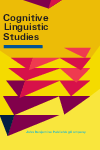
Cognitive Linguistic Studies
Fostering Interdisciplinary Dialogues in Cognitive LinguisticsCognitive Linguistic Studies is a prestigious journal published by JOHN BENJAMINS PUBLISHING CO, dedicated to advancing the interdisciplinary field of cognitive linguistics. With an ISSN of 2213-8722 and an E-ISSN of 2213-8730, the journal serves as an essential platform for the dissemination of high-quality research that delves into the intricate relationships between language, thought, and cultural contexts. Located in the vibrant academic milieu of the Netherlands, this journal has gained recognition for its impactful contributions, reflected in its respectable Q2 category ranking within the field of Linguistics and Language as of 2023. Redesigned to accommodate a broader audience, the journal welcomes original research articles, reviews, and theoretical discussions that bridge cognitive science and linguistic inquiry. As the journal continues its trajectory of growth, being indexed with a solid Scopus rank of #459 out of 1167 in the social sciences, it remains a vital resource for researchers, professionals, and students eager to explore the dynamic interplay between cognition and language.

Estudios de Linguistica-Universidad de Alicante-ELUA
Elevating Linguistics: Where Research Meets AccessibilityEstudios de Linguistica-Universidad de Alicante-ELUA is a distinguished academic journal dedicated to advancing the field of linguistics, published by Universidad de Alicante. With an Open Access model adopted since 2020, ELUA facilitates greater accessibility to pioneering research for scholars and enthusiasts alike. The journal's ISSN is 0212-7636 and its E-ISSN is 2171-6692, ensuring it is indexed and easily discoverable in academic databases. Though the journal's H-Index is currently not specified, its commitment to disseminating high-quality linguistics research positions it as a valuable resource for researchers, professionals, and students. The journal aims to foster scholarly dialogue and innovation in various linguistic domains, making it an essential platform for sharing insights and findings that shape contemporary linguistic studies. Based in Alicante, Spain, ELUA is poised to contribute significantly to the global linguistics landscape.